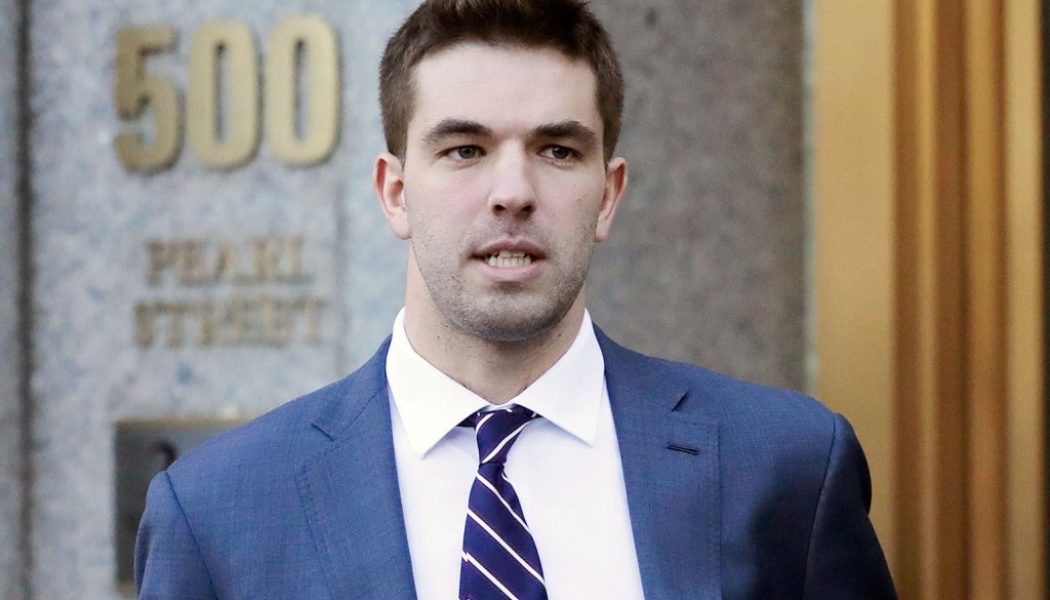
Billy McFarland, convicted felon and founder of the infamous 2017 Fyre Festival, is back with a new venture.
In a video released Monday (Oct. 24) to TikTok and YouTube Shorts, the disgraced entrepreneur — who was released from prison in March after serving four years behind bars — notes he’s “working on something new” that’s “a little crazier but a whole lot bigger than anything I’ve ever tried before.” He then flips a whiteboard to reveal a treasure map taped to the other side and says he’ll reveal the full scope of his plans in November. “This time, everybody’s invited,” he adds, before ripping the treasure map from the whiteboard to reveal a phone number.
Calling the number from a cell phone causes a text message reading “Welcome to the Treasure Hunt” to be automatically delivered to the number of the person calling, along with a link to an online form. After adding contact info to the form, a second text comes through that links to a cryptic 12-second YouTube video titled “RLTH Clue #1,” featuring underwater imagery of sharks, a glass bottle with a cork and what appears to be a tropical island. The video has since been removed from TikTok, though it remains available to watch on YouTube Shorts.
No additional information on the venture is known at this time, and representatives for McFarland declined to comment further.
In 2018, McFarland was sentenced to six years in prison after he admitted to defrauding investors in the Fyre Festival, which promised ticket holders a luxurious music event on Exuma island in the Bahamas with performances from acts including Pusha T, Blink-182, Major Lazer, Migos, Lil Yachty and Disclosure. But when attendees arrived on the island, they discovered the event was a sham. In addition to the Fyre Festival fraud, McFarland also pleaded guilty to charges in a subsequent ticket-selling scam.
McFarland lobbied for compassionate release in 2020 early in the coronavirus pandemic, claiming he was “totally vulnerable” to COVID-19, but his request was denied (he later confirmed he had contracted the virus). Following his release from Milan Federal Correctional Institution in Milan, Michigan, his attorney Jason Russo confirmed to Billboard that he was moved to a halfway house in New York, with a release set for Aug. 30.
In addition to his prison sentence, McFarland was ordered to pay roughly $26 million in restitution for his crimes. In May, Russo told Billboard that McFarland was focused on finding “the best way to generate income to pay this restitution back and make amends,” adding, “Any new projects that he does become involved in will be done solely for the purpose of generating the restitution for paying back his victims.”
In addition to his criminal victims, McFarland also owes nearly $11 million to the creditors of Fyre Festival LLC as part of a default judgement won by the trustee of the festival, Gregory Messer. A separate $3.4 million judgement is owed to the state by the now defunct Fyre Media Inc.
Owing victims of a federal crime restitution money is one of the most onerous debts to have, says Curtis Briggs, a California criminal attorney. Briggs notes that the federal government’s reach into the financial system, coupled with rules that allow collection from retirement accounts and supersede state and federal bankruptcy protections, makes the feds a “super creditor” with the “most intrusive methods” available to it for collecting debt.
“Anything he legitimately declares as income” will be subject to collection by the government to repay his victims, says Briggs, who successfully defended one of two Oakland men prosecuted in the Ghost Ship fire and currently represents Black Lives Matter activist Tianna Arata.
Without any tangible assets to seize or a salary to garnish, collecting a judgement will likely mean scrutinizing McFarland’s annual tax return and monitoring his bank accounts. McFarland will be granted a modest court-monitored income and if he is operating a business, he will be allowed to write off certain expenses, but “his finances will be closely scrutinized by attorneys for the families of the victims” and FBI agents assigned to him, says Briggs.
[flexi-common-toolbar] [flexi-form class=”flexi_form_style” title=”Submit to Flexi” name=”my_form” ajax=”true”][flexi-form-tag type=”post_title” class=”fl-input” title=”Title” value=”” required=”true”][flexi-form-tag type=”category” title=”Select category”][flexi-form-tag type=”tag” title=”Insert tag”][flexi-form-tag type=”article” class=”fl-textarea” title=”Description” ][flexi-form-tag type=”file” title=”Select file” required=”true”][flexi-form-tag type=”submit” name=”submit” value=”Submit Now”] [/flexi-form]










Tagged: Billy McFarland, business, entertainment blog, festivals, Fyre Festival, music blog, Touring